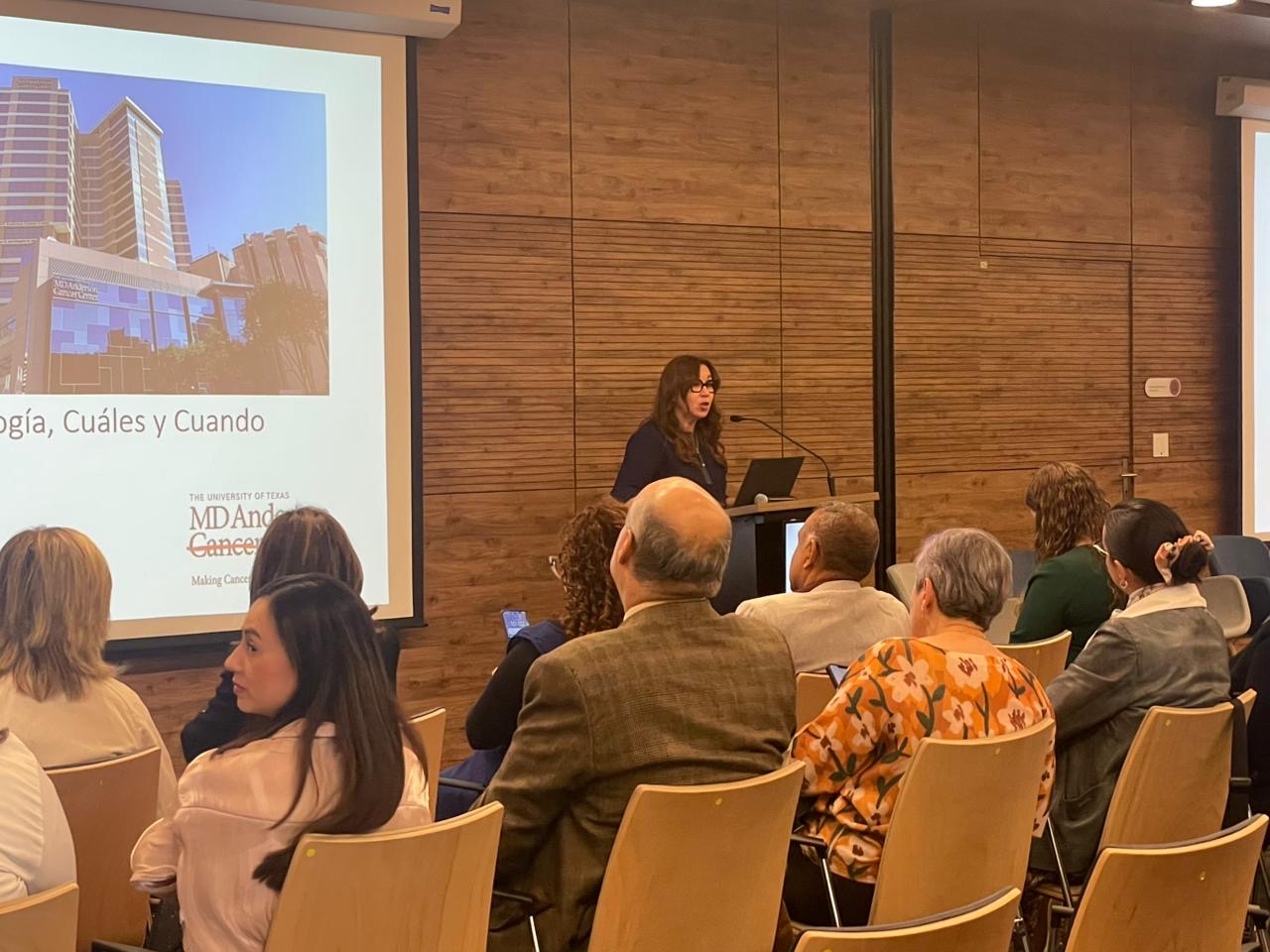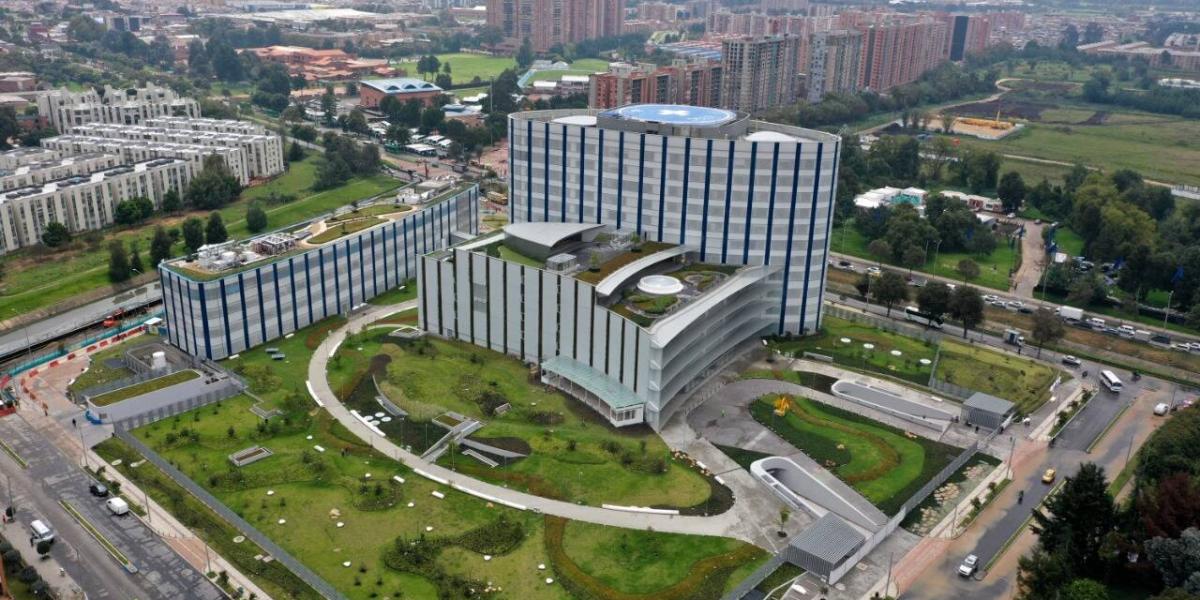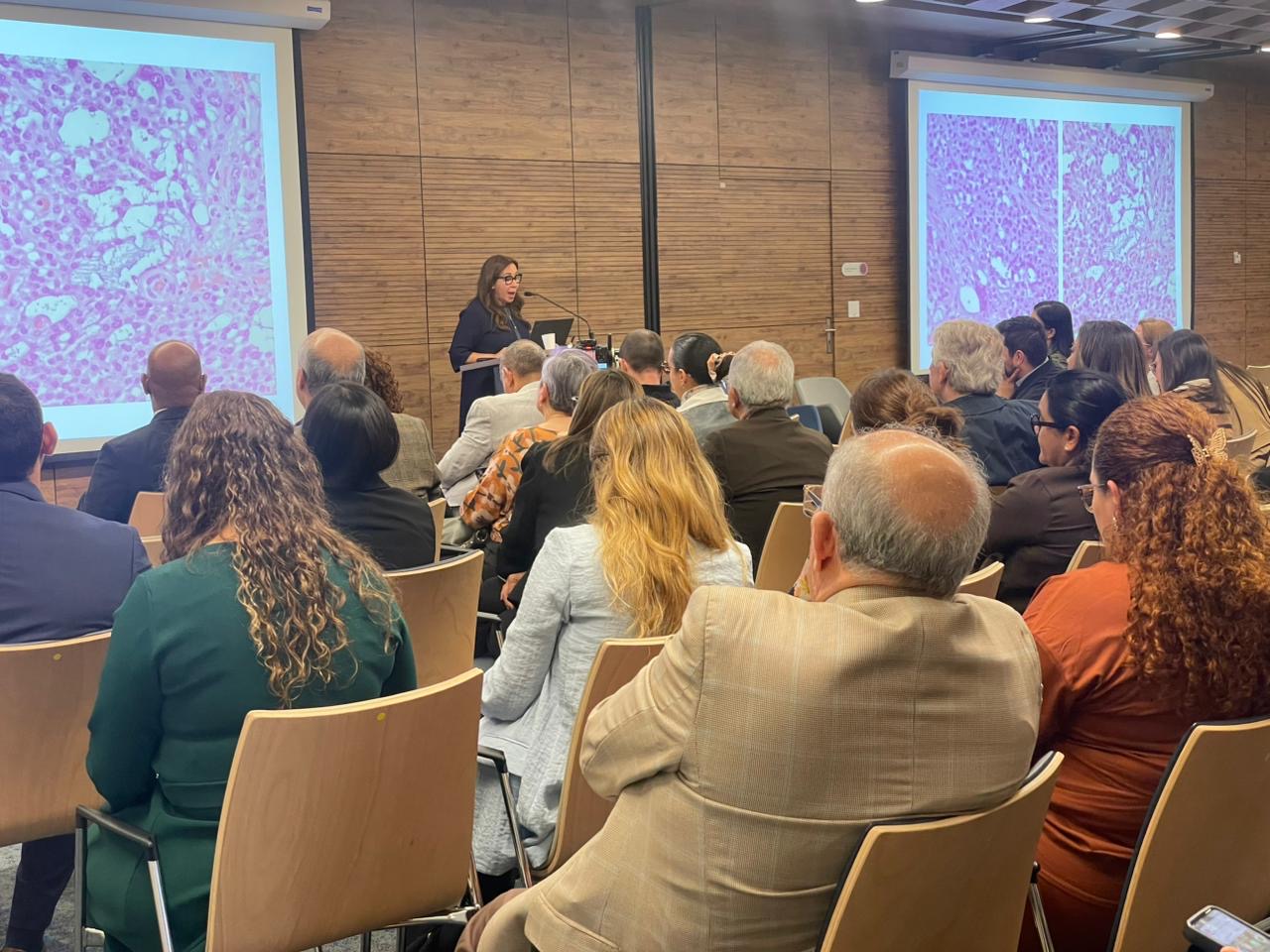'I'm impressed with the CTIC. What I saw here I haven't seen in other centers': Anais Malpica, a world leader in gynecological cancer.

Dr. Anais Malpica is one of the most renowned gynecological pathologists worldwide. With more than two decades of experience, her work has set the standard in the diagnosis and management of ovarian neoplasia, endometrial tumors, mesenchymal lesions, and complex pathologies of the female genital tract.
Today, Malpica is a member of the MD Anderson Cancer Center in Houston—the leading cancer center in the United States—and, in addition to his outstanding clinical work, he has promoted research and training projects, directing his institution's Gynecologic Pathology Fellowship and co-chairing the Educational Committee of the International Society of Gynecologic Pathology.

Dr. Anais Malpica, a world leader in gynecological cancer, at her lecture at the CTIC. Photo: CTIC
This week, the specialist and researcher visited Colombia after more than ten years of not being there. The event was an academic refresher course on gynecological cancer organized by the Luis Carlos Sarmiento Angulo Cancer Treatment and Research Center (CTIC).
Participants in the free event, open to the general public in the healthcare sector, had a unique opportunity to hear from a specialist who combines practice in highly complex cases with global research and teaching. Malpica came to the country to share MD Anderson's expertise in addressing gynecological cancers and advances in molecular classification, immunotherapy, and precision treatments.
But in addition to presenting the latest findings in gynecological oncology, Malpica, who travels the world speaking about her research, said she was impressed by the CTIC. "What I saw here I haven't seen in other centers," she enthused, highlighting how clinical care, research, and academia are integrated into one facility, with a comprehensive model that amazed her even before she set foot on its premises.

CTIC facilities. Photo: Mauricio Moreno. EL TIEMPO
In an interview with EL TIEMPO, Dr. Malpica highlighted the advances in the management of endometrial and ovarian cancer, where molecular classification and precision therapies have completely changed the clinical landscape; she pointed out the persistent challenges in HPV-associated cervical cancer, which has a significant impact in the region; she explained how immunotherapy and targeted therapies are revolutionizing gynecological oncology; and she underscored the importance of viewing cancer as a chronic disease that requires comprehensive and multidisciplinary approaches.
He also emphasized the need to create accessible training spaces, such as those promoted by the CTIC, so that more professionals can update themselves and replicate these models in Latin American countries.
You said that the CTIC impressed you even before you arrived. Why? It's a great honor to be at this symposium dedicated to women here at the CTIC. I'm quite impressed. The last time I was in Bogotá, 10 or 12 years ago, my point of reference was other oncology hospitals, but the fact that efforts are now concentrated in a single center where patients are cared for comprehensively, academics are fostered, and research is promoted seems extraordinary to me.
Generally, before visiting an institution, I check its website. I did this with the CTIC and was amazed by everything I found. In fact, I showed the website to a colleague, Dr. Elizabeth Fer, and she told me, "If I get sick, I'd like to be there." I think that's the highest compliment you can give a place.
What do you think about this symposium being free and open to all interested parties? That's incredibly important. In most countries, academic events require a fee to cover expenses. Here, however, the doors were opened to everyone free of charge, which is very unusual and, I'd say, almost miraculous. I've visited centers in Asia, Africa, Europe, and America, and I've rarely seen anything like this. I was very happy to see so many young people present, because when you're starting out in oncology, resources are limited, and attending a conference is often impossible without scholarships. Here, they made it possible, and that's wonderful.
What did you come to talk about at this event, and how do you see the current state of oncology in Colombia? The world of oncology has evolved significantly. It's no longer just about seeking conventional treatments, but also new, more effective therapeutic approaches with fewer side effects that allow for a better quality of life. This symposium opens up that range of possibilities. In my talk, I spoke about endometrial carcinoma, a common tumor whose management changed with the molecular classification introduced in 2013. This revolutionized the field. We're still awaiting prospective results to be published in 2028, but we already know that what was once considered immutable is now modifiable.

Gynecological cancer update session at the CTIC. Photo: CTIC
In endometrial carcinoma, we've already seen a complete change in the way we analyze and treat this tumor. In ovarian cancer, we have results that allow for adjusting therapies. And in cervical carcinoma, related to HPV, we continue to face a significant challenge in regions like Latin America. One of the greatest advances globally has been immunotherapy and precision treatments, which are already being used in the United States and Europe. Here, we've shared experiences on how to implement them.
From an expert's perspective, how do you see the future of cancer treatments? We are undergoing a paradigm shift. Cancer is no longer understood solely as a terminal illness, but as a chronic condition that can be managed long-term. In my presentations, I showed cases of rare tumors that require us to look beyond the individual patient and consider familial genetic factors. This involves integrating genetic counselors and other specialists, so that not only the diagnosed patient benefits, but also their at-risk family members.

Talking about other types of cancer that also affect women is key, according to Malpica. Photo: iStock
The mere existence of these academic spaces opens up possibilities. Oncologists here can begin to think not just about the three or four most well-known tumors, but about a broader spectrum. This requires multidisciplinary teams and the integration of new players into clinical practice. When we share knowledge between institutions like MD Anderson and CTIC, we mutually nourish each other. That is the foundation for evolving cancer care.
Environment and Health Journalist
eltiempo

%3Aformat(jpg)%3Aquality(99)%3Awatermark(f.elconfidencial.com%2Ffile%2Fa73%2Ff85%2Fd17%2Fa73f85d17f0b2300eddff0d114d4ab10.png%2C0%2C275%2C1)%2Ff.elconfidencial.com%2Foriginal%2F9c6%2F9f2%2F99c%2F9c69f299c71245a01040633596eb653c.jpg&w=3840&q=100)



